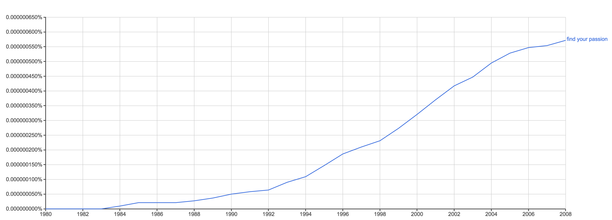Compare courses from top Australian unis, TAFEs and other training organisations.
Feeling Lost? Here’s How to Find Your Passion
Conventional wisdom says, Do what you love and the money will follow. But what if you still don’t know what you want to be ‘when you grow up?’ Here are some unique ways to discover your passion and uncover what you really want to do with your life.
Zahra Campbell Avenell
Oct 31,2016
“You’ve got to find what you love. And that is as true for your work as it is for your lovers. Your work is going to fill a large part of your life, and the only way to be truly satisfied is to do what you believe is great work. And the only way to do great work is to love what you do. If you haven’t found it yet, keep looking. Don’t settle.”
– Steve Jobs, Stanford University Commencement Address, 2005
If you don’t know the answer to ‘What Should I Do With My Life?’ and you’re in your 20s, 30s or even 40s, know that you’re not alone.
Let me start by telling you a story:
When I was 5, all I wanted was to be a Care Bear. So much so, in fact, that I started my very own spinoff version called The Care Hares.
I recruited ruthlessly. The mission was serious, and seriously big-picture: helping others through caring.
The problem was, not many people seemed to need our help.
I longed for someone to fall in the dirt, to scrape their knee, to cry uncontrollably. Day after day I sat waiting, eyes peeled for catastrophe, armed with my makeshift first aid kit stuffed full of band-aids since my mum had denied me access to the good stuff, so a fall would have to do.
Then – finally – my luck turned.
A girl at my school fell over.
I was so excited. My heart started beating faster as I flew across the playground. As her cries pierced the schoolyard, I patted her head and told her not to worry about calling the nurse, because I was a Care Hare and I was going to help her. As I placed a band-aid triumphantly on her knee, I had a sinking realization. Being a Care Hare meant touching people who had mud and asphalt and blood on their body parts – and that was gross.
And that was the end of the Care Hares.
Three years later, I injected the same zeal into NASA.
I had recently learnt that they’d sent dogs and chimpanzees into space – and I was jealous.
Surely I would be of more use in space than a dog? Thus began The Astronaut Years.
At 12, I desperately wanted to be a primatologist.
Then a model. Then a fashion designer. Then a travel journalist.
What about you?
What did you want to be when you grew up?
More importantly, are you doing it now?
We all had passions when we were children. Whether it was getting lost in reading the latest Harry Potter book, building new worlds in Minecraft or playing cricket in the back yard, we’d forget to eat or sleep or bathe as we were immersed in the pleasure of doing what we loved.
What happened to that?
Why don’t we do that anymore?
The problem is, when you’re an adult, you tend to get sidetracked. Often it’s by important but unsexy things like Telstra bills and Strata meetings and industry super funds and what’s for dinner – or even just the nightly Netflix queue.
We end up burying our passions in the same place we buried our treasures in the garden. We wake up one day and find ourselves stuck in dead-end jobs, living day to day and paycheque to paycheque.
I’m here to tell you that it doesn’t have to be this way.
I promise.
Now, I’m not saying it’s easy.
When I was in my 20s, I landed a job working for a bank. It sounded impressive, plus they kept paying me more and giving me nice-sounding titles. So I stuck around.
Those were the worst 3 years of my life.
Why?
Because I was going against every instinct I had to follow my passion.
…because I wasn’t really sure what my passion was.
I knew I liked writing, but I didn’t think I could make it work.
After all, I also liked knitting, but there’s no way I was going to knit scarves for a living!
There’s no money in writing, my brain argued. You won’t find work. There’s too much competition. You won’t be able to pay rent.
The excuses were a mile long.
The truth is, finding your passion – something that makes you leap out of bed each morning – is hard. It’s uncomfortable. It’s downright terrifying.
But this is your life.
Why SHOULDN’T you make it extraordinary?
The eloquent and stunning Holstee manifesto puts it best:
Think about people that are passionate. Muhammad Ali. Elon Musk. Oprah. Your sixth-grade history teacher who made his lessons come alive. Most of these people didn’t necessarily succeed right away, but it didn’t stop them from trying. Passion can’t be taught. You either have it – and it oozes out of you, infecting everyone you meet with it – or you don’t.
The good news is, everyone is passionate about something.
You just have to identify what your passion is.
The idea of finding your passion might be ubiquitous today, but it’s actually a relatively new concept in the history of mankind. After all, our ancestors were too busy hunting down mammoths to worry about whether or not they were passionate about fending for themselves.
Technological advancements have freed up our time for more creative and fulfilling pursuits, so that work is no longer simply a means to an end.
And we’re about a gazillion times luckier than anyone else in human history – because we can pursue our passions both within and outside of work.
Passion is the difference between having a job where you’re watching the clock, and one where you don’t even notice when it’s time to go home.
These aphorisms exist for a reason:
Do what you love and you’ll never work a day in your life.
Do what you love, love what you do.
Chase your passion and the money will follow.
While I’m well aware that there is a burgeoning camp that believes in not following your passion, I think that it’s made up of a bunch of naysayers who couldn’t do what they wanted.
It’s probably not particularly surprising that more money is unlikely to make you happier. But enjoying what you do certainly will, as it’s easy to be engaged and immersed in something you’re passionate about.
But that seems easier said than done, right? Surely if you knew what your passion was, you’d already be immersed in it as we speak.
Except for the lucky few who’ve always known what they wanted to do and are doing it, most of us find ourselves at this juncture. The good news is, it is possible to find out what your passion is.
Follow the steps below to zero in on YOUR true passion.
ASK YOURSELF:
Make sure that you take the time to work through these questions, and write them down so you can revisit them after some reflection.
What would you do if money were no object?
Be honest with yourself – if all jobs paid the same, what would you be doing? Would you be helping animals? Would you be a chef? A stand-up comedian? A vet? There’s nothing wrong with money – but prioritising it over passion is the easiest way to burn out and crush your soul. Of course you may find yourself in a situation where you have to work in a less-than-fulfilling job to pay the bills, but that doesn’t mean that giving up on your passion altogether.
What are some things you love to do?
Take some time to sit in a quiet spot and ponder what brings you joy. Don’t think about ‘the one’ – instead, make a list of anything you enjoy. Do you like doodling? Do you love decorating? Use your books, DVDs and purchases as cues: what are you endlessly curious about? What areas do you find yourself gravitating towards? What activities make you lose track of time?
What inspires you? What motivates you? What excites you? What are you most proud of?
What could you do for hours/days/weeks/years without getting burned out? No one knows this but you. The answer is less important than the intensity. What does your ideal day look like? Imagine what it would feel like to live this ideal every single day – feeling content, fulfilled and happy about your life.
What are you really good at?
Are you the go-to person for something in particular? Think about what your family, friends and coworkers reach out to you for, and what they say you should be doing for a living. Are you the first person people go to for life advice or a shoulder to cry on? A fashion emergency? A workout program?
What do you want to be when you grow up?
Imagine looking into a crystal ball, and seeing what you’re like in the future. Who are you when you’re 55? 65? What have you accomplished? Have you helped people? Made something? Inspired someone? Created something that will outlive you? If you could start over, what would you do differently? Focus on that, and make it yours.
Think about your deathbed. What do you regret not doing?
When faced with their own mortality, dying people were most likely to regret not living a life that was true to themselves, reveals Bronnie Ware, a palliative care nurse who looked after the dying. You’re far more likely to regret not doing something than doing it and failing – so why not try? What have you always wanted to do? What are you so afraid of?
What do you want to be remembered for?
This sounds a tad morbid, but stay with me: Imagine that it’s your funeral. What are people saying about you? Were you the funniest person they knew? Did your city lose a fashion icon? What legacy do you want to leave behind?
NOW TAKE ACTION
Based on the exercise above, shortlist the top 3 activities that bring you joy. Start there and go down your list.
Try a few (and quit fast)
Now comes the scary (and fun!) part. If you’re not already actively doing the things you enjoy, make time to try them out. Research shows that trying new things increases dopamine levels in your brain and makes you happier. So keep trying new things. The ones you like, keep. The ones you don’t, discard.
Expand your mind (and your horizons)
Put yourself out there. Sign up for an improv comedy class. Even better, sign up to do stand-up at a local pub. Go outside your comfort zone, broaden your mind and get your hands dirty. Figure out what makes you come alive.
Reach out to your network
If you know someone whose job you’d trade in a heartbeat, pick their brain. They might give you some ideas that you haven’t considered, introduce you to new people, or even help you be more objective and realistic about your goals. Be honest and ask them as many questions as you can: what is their work/life balance like? What do they wish they’d known when they were starting out? Who are their mentors?
Invest in yourself
If you can try out some activities for free, awesome. Otherwise, look at what you spend as an investment in your future. After all, what’s the price of finding your life’s passion? You may have to go back to university, get more training, volunteer your time for free or get a mentor. You may even find that you need to get a part-time job to support yourself as you pursue your dream career. When you experience the benefits of pursuing your passion and living an authentic life that’s full of purpose, any sacrifice you make will have been worth it.
CONSIDER THIS
Once you’ve narrowed your list of passions, here are some things to consider.
What if you love it – but are no good at it?
There might be some things that you like doing, but you’re no good at. (I like singing in the shower, but I’d never do it for a living!) Work out if you can still pursue these passions as hobbies instead. Who cares if you won’t be a famous rugby player if you enjoy playing with your mates every week?
Make it about other people
It’s been proven – time and time again – that helping others is tremendously satisfying. Instead of thinking about yourself and how much money you can make, start off by thinking of a problem you can help to solve. Giving back to others is connected to a deeper sense of purpose. Teach others what you know, or find a way to give back.
Don’t compare yourself to others
If money made people happy, Bill Gates would be the happiest person in the world. (Surprise – he’s not! Brain scans reveal that the happiest person in the world is a Buddhist monk named Matthieu Ricard.) Keeping up with the Joneses (or the Andy Warhols, or the Amy Schumers, depending on your passion) is a terrible idea. ‘Comparison’, Ricard says, ‘is the killer of happiness’.
Whittle it down
At the end of this exercise, you should end up with a list of activities that you enjoy, find meaningful and are in keeping with your values and personal brand. NYU Career Tracks suggests an exercise where you bookmark various jobs and see what they have in common.
Fast forward to today.
I ended up quitting my banking job, and I’ve been a professional writer for several years now. And I couldn’t be happier.
In the words of the philosopher Georg Wilhelm Friedrich Hegel,
My friend,
Have the courage to find your passion, hone it and pursue it relentlessly.
Anything else is a waste.
Find out how to use your passion to find a fulfilling career.
About the author
Zahra Campbell-Avenell covers career planning, skill development, and professional advice at Career FAQs.





